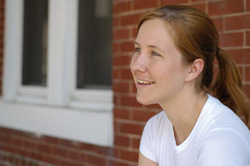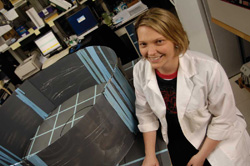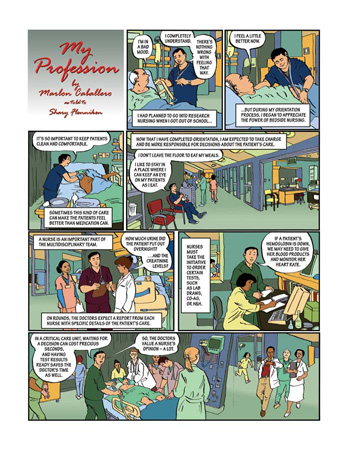By Teddi Fine
Photos by Will Kirk

Connecticut native Rachel Walker and Colorado-born Chase Gray have much in common. Both served in the Peace Corps before matriculating at the School of Nursing; both graduated with nursing baccalaureates this spring. And, as 2006 recipients of the University Provost’s Undergraduate Research Awards, both have collaborated with faculty mentors on projects valuable to nursing science.
Walker, working with guidance from associate professor Phyllis Sharps, PhD, RN, FAAN, conducted interviews with African-American women in Baltimore City to explore how health-promoting behaviors related to HIV prevention (encouraging partner’s condom use, use of health services, and HIV testing) may be influenced by the experience of intimate partner violence or violence in the community.
Walker’s research among women in Baltimore drew on some of her Peace Corps experience in Mali, where she had worked with local midwives to combat HIV/AIDS and the practice of female genital mutilation to improve women’s health outcomes. “In Mali, the concept of ‘intimate partner violence’ wasn’t a public health focus the way it is in the States. In fact, until I started working with Dr. Sharps, I didn’t even know that a body of research is being built on the topic or that nurse researchers are in the forefront of the field,” she says.
She adds, “Working with Dr. Sharps was incredible. I didn’t just learn about the process of community-based research; I also gained an even greater sense of responsibility to help find answers in the community.”
Walker is working now as an oncology nurse at the Weinberg Center while pursuing graduate studies that include both an MPH and, eventually, a nursing PhD. Her goal: “to work at the policy end to sustain change, to teach, and to improve clinical work at the community level.”

Chase Gray, who engaged in animal-based research examining the complex interconnections between pain and anxiety, was paired with mentor Gayle Page, RN, DNSc, FAAN. “Doing heavy science—in this case, testing the effects of induced low-level chronic pain on male and female rats, then measuring for baseline anxiety levels—was very different from anything I had ever done,” says Gray, whose Peace Corps experience took her to Uzbekistan. “I gained an appreciation of what it takes to move knowledge from basic research all the way to community care. It’s a long process with a lot of trial and error and a lot of replication at every step along the way.”
Still in its early pilot stages, the research is asking, for example, whether pain may be amplified as the result of pre-existing or evolving anxiety, or if anxiety is a result of the pain experience. Preliminary pilot data suggest that the pain-anxiety relationship is worth continued investigation, Gray says.
“This research ultimately can help identify better ways to help manage patient pain by showing how pain is affected by other biological and behavioral factors, such as gender and anxiety. And I got to work at the very beginnings of that discovery process,” says Gray, who is considering a PhD in nursing that would eventually allow her to combine teaching, clinical care, and policy-informing research.
In late spring, Gillian Condell ’08 was selected as the school’s Provost’s Undergraduate Research Award recipient for 2007-08. Through animal studies conducted with faculty member Gayle Page, she will be examining whether the medications used to treat post-surgical pain will aid or hinder the normalization of sleep patterns after surgery.
 Safeguarding the Folks Back Home
Safeguarding the Folks Back Home Hands & Words Are Not For Hurting
Hands & Words Are Not For Hurting Collaborative Healthcare through Simulation
Collaborative Healthcare through Simulation Letters to the Editor
Letters to the Editor My Profession
My Profession







